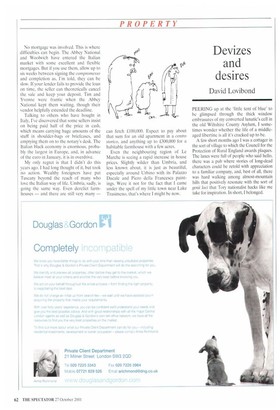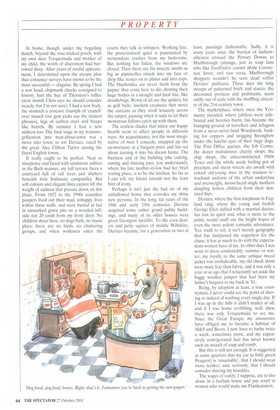Devizes and desires
David Lovibond
PEERING up at the 'little tent of blue' to be glimpsed through the thick window embrasures of my converted lunatic's cell in the old Wiltshire County Asylum, I sometimes wonder whether the life of a middleaged libertine is all it's cracked up to be.
A few short months ago I was a cottager in the sort of village to which the Council for the Protection of Rural England awards plaques. The lanes were full of people who said hello, there was a pub where stories of long-dead characters could be retold with appreciation to a familiar company, and, best of all, there was hard walking among almost-mountain hills that positively resonate with the sort of genii loci that Tory nationalist hacks like me take for inspiration. In short, I belonged. At home, though, under the beguiling thatch, beyond the rose-tricked porch, with my own dear Torquemada and mother of my child, the worm of discontent had burrowed deep. After years of sordid appeasement, I determined upon the escape plan that consumer surveys have shown to he the most successful — disguise. By spring I had a new head, chipmunk cheeks consigned to history, hair the hue of Thornton's toffee (next month Chris says we should consider treacle, but I'm not sure). I had a new body, the stomach a concave triumph of 'crunch' over munch (we gym jocks use the neatest phrases), legs of carbon steel and biceps like barrels. By summer I had a new address too. The final stage in my transmogrification into man-about-town was a move into town; to wit Devizes, rated by the great Alec Clifton Taylor among the finest English towns.
It really ought to be perfect. Neat as ninepence and faced with sandstone ashlars in the Bath manner, my tall terrace faces a courtyard full of tall trees and shelters beneath twin 1talianate campaniles. But soft colours and elegant lines cannot lift the weight of sadness that presses down on this place. From 1852 to the 1990s countless paupers lived out their mad, unhappy lives within these walls, and were buried at last in unmarked grave pits on a wooded hillside not 20 yards from my front door. No children shout here, no dogs bark, no music plays: there are no birds, no chattering groups, and when workmen enter the courts they talk in whispers. Working late, the preternatural quiet is punctuated by tremendous crashes from my bedrooms. But nothing has fallen, the windows are closed. Then there are the insects: moths as big as pipistrelles smack into my face or drop like stones on to plates and into cups. The bluebottles are never fresh from the pupae; they come here to die, droning their huge bodies in a straight and fatal line, like doodlebugs. Worst of all are the spiders, fat as golf balls, insolent creatures that move the curtains as they stroll leisurely across the carpet, pausing when it suits to let their monstrous fellows catch up with them.
The restless shades that infest our happy hearth seem to affect people in different ways. An acquaintance, not the most imaginative of men I concede, snapped up the ex-mortuary at a bargain price and has set about turning it into his dream home. The business end of the building (the cutting, sawing and sluicing part, you understand), where his late mother-in-law had her brief resting place, is to be the kitchen. So far as I can tell, my friend intends not the least hint of irony.
Perhaps it isn't just the bad air of my unhallowed home that corrodes my shiny new persona. In the long, fat years of the 18th and early 19th centuries, Devizes acquired some rather grand public buildings, and many of its older houses were given Georgian facelifts. To the corn dealers and petty squires of middle Wiltshire, Devizes became, for a generation or two at
least, passingly fashionable. Sadly, it is many years since the burden of fashionableness crossed the Pewsey Downs to Marlborough (strange, just as soap fans who like EastEnders cannot abide Coronation Street, and vice versa, Marlborough shoppers wouldn't be seen dead within Devizes' purlieus). These days the long sweeps of patterned brick and stucco, the decorated porticos and pediments, seem oddly out of scale with the shuffling citizenry of the 21st-century town.
The marketplace, where once the Yeomanry paraded, where jubilees were celebrated and heretics burnt, has become the lounging ground of travellers and refugees from a never-never-land Woodstock, busking for coppers and swigging Strongbow under the baleful eyes of their huge dogs. The Post Office queues, the Job Centre, the dozen malodorous charity shops, the chip shops, the unreconstructed 1960s Tesco and the whole seedy boiling pot of precincts and mean streets are awash with cowed old-young men in the trainers-n'tracksuit uniform of the urban underclass and overweight, moon-faced single mothers dangling listless children from their denimed hips.
Devizes, where the first telephone in England rang, where the young and foolish George Eliot dallied with a married doctor, has lost its spirit and, what is more to the point, would snuff out the bright hopes of even the most ardent romantic adventurer. Yet, truth to tell, it isn't merely geography that has dampened ray eagerness for the chase: it has as much to do with the expectations women have of me. In other days I was wont to dress comfortably: summer or winter, my loyalty to the same antique tweed jacket was unshakeable, my old check shirts were more fray than fabric, and it was only a year or so ago that I reluctantly set aside the baggy woollen jumper that had been my father's bequest to me back in '81.
Being, by adoption at least, a true countryman, I never could see the point of shaving or indeed of washing every single day. If I was up in the hills it didn't matter at all, and if I was home scribbling, well, then, there was only Torquemada to see me. Since the Great Escape, my amourettes have obliged me to become a habitué of M&S and Boots. I now have to bathe twice a week, sometimes more, and my expensively reinvigorated hair has never known such an assault of soap and comb.
But this is still not enough. It is suggested in some quarters that my car (a little green Peugeot) is 'unsuitable', that I should wear more leather, and, seriously, that I should consider shaving my knuckles.
The wages of vanity, I suppose, are to live alone in a bedlam house and pay court to women who would make me Frankenstein.











































































 Previous page
Previous page